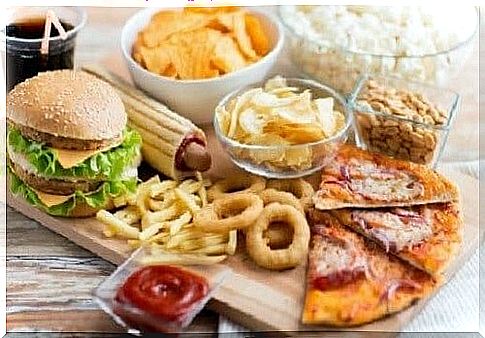6 Dietary Habits In The Fight Against Chronic Fatigue

Do you always feel tired? You may also experience that it doesn’t matter how much you sleep. You still feel like you can’t do anything. If so, you may be suffering from chronic fatigue. Your diet can play an important role in the fight against chronic fatigue.
A poor diet is one of the causes that can lead to this problem. It’s no secret that what you eat fuels your body. It also affects how you feel.
Chronic fatigue makes you crave coffee immediately upon waking. And that’s not the only problem. You also feel that you always have little energy.
It’s a complicated problem that we can’t connect to a specific condition. The worst part is that the fatigue gets worse when you go about your daily activities.
The good news is that you don’t have to struggle with the effects of chronic fatigue forever. After all, you can make some changes in your dietary habits. That way you can get the energy you need. In this article we explain what you can do in the fight against chronic fatigue.
Dietary habits that can help fight chronic fatigue
1. Stay Hydrated

Drinking water doesn’t just fight chronic fatigue. You will also help your body distribute the essential molecules and other elements.
This means that drinking water promotes the removal process of toxic substances and residual waste. After all, they can affect your organs. Drinking water also starts the metabolic processes in the body. We all know that being dehydrated can lead to the feeling of fatigue.
2. Keep a log of your diet and your emotions

This is yet another trick in the fight against chronic fatigue. Keep a detailed record of the products you eat and drink. You should also keep a record of your moods at different times of the day.
Keeping a log has several objectives:
- An overview of what you eat can help you understand why you feel low on energy. Sugar, for example, can give you an energy spike. However, it will drain your energy at a later date. Agave syrup, on the other hand, can provide you with energy without causing chronic fatigue.
- You will see which foods make you feel good or bad emotionally. Have you ever heard that chocolate can help the body release endorphins and make you feel happy as a result?
Indeed, there are several foods that can affect your mood. It is therefore important that you know how you can determine how they affect you. It is fundamental that you keep a log of your emotions so that you can better understand them.
By keeping a record, you may even come to the conclusion that your fatigue is actually a symptom of irritable bowel syndrome.
3. Do not remove food from your diet without medical supervision
We know that fighting chronic fatigue isn’t easy. However, you shouldn’t do it by eliminating food groups from your diet. However, you should discuss the overview of your diet and your emotions with a nutritionist.
Then you continue working with him or her and draw up a nutrition plan. This plan will help you test and determine if a particular food is causing you fatigue. By following this you can reduce the risks of suffering from some form of nutritional deficiency.
4. Give yourself the chance to experiment with your diet

Try foods you don’t usually eat. However, make sure they are known to promote energy. Certain combinations of carbohydrates, proteins and fats can be beneficial in the fight against chronic fatigue.
The problem is that every body reacts differently to different combinations. That means there is no such thing as a standard diet. You should also make it a point to try foods that you have never eaten before.
It can be difficult to get used to new flavors at first. However, give yourself some time to familiarize yourself with it.
5. Eat smaller portions regularly

Smaller portions will help boost your energy when you’re feeling tired or hungry. However, stopping eating altogether can cause weight gain. This can eventually lead to a vicious cycle of fatigue.
To avoid this, eat something every three or four hours. You can mix some fruit with a food with proteins and a type of fat. This way you ensure that you get enough nutrients.
We give you some ideas:
- 30 grams of cheese + 5 walnuts + 1 apple
- 2 slices turkey breast + 10 almonds + 3 guavas
- Roasted chicken + 3 tablespoons sunflower seeds + 1/2 cup cranberries
- 1 cup yogurt + 5 walnuts + 6 strawberries
These choices can not only ensure that you are full of energy. They are also simple, cheap and you can take them anywhere. What more could you want from a snack?
6. Avoid stimulants

At the beginning of this article, we talked about the need for a cup of coffee.
Even though coffee gives you a feeling of energy, that feeling is fleeting. It will also lead to a breakdown afterwards.
Make sure to avoid the following foods:
- Coffee. It causes stress on your nervous system. This creates energy spikes that exacerbate chronic fatigue after two or three hours. Instead of coffee, try aloe vera juice, green tea, or mint tea.
- Junk food. This is something you crave when you’re a little hungry. Junk foods, however, make your blood sugar levels soar. You will feel tired just minutes after eating junk food.
- Moreover, junk food does not provide you with anything nutritious in any way. It will also only be a matter of hours before you feel hungry again. So you should opt for fresh foods such as fruit, salads or smoothies.
We have no doubt that these suggestions can help you. You will feel much better prepared to perform all your daily activities. So remember that the better you eat, the better you will feel.








